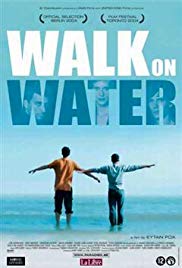Note that all well-reasoned responses are acceptable.
For Social Studies Classes: Questions 1 – 3 & 5 below, as well as questions 6 – 11 in the Supplemental Materials are appropriate for Social Studies Classes. These discussion questions provide opportunities for cross-curricular instruction.
For ELA Classes
A. Theme
1. The title and the following dialog provide assistance in deriving one of the themes of the film. This exchange occurs when Axel falls into the Sea of Galilee after telling Eyal that he was going to walk on water.
Eyal: [sarcastically] Bravo. You did it!
Axel: You don’t understand. You can’t just come to the Sea of Galilee and start walking on water. If you could, everybody would be doing it. You need to prepare yourself.
Eyal: And how would you do that? Please enlighten me.
Axel: Well, you need to completely purify yourself. Your heart needs to be like it’s clean from the inside: no negativity, no bad thoughts.
Eyal: And then?
Axel: And then you can walk on water. I’m sure of it.
Describe how this dialog relates to an important theme of the movie.
Suggested Response:
Purity (being clean from the inside with no negativity or bad thoughts), in the sense used in this film, is to live in a right relation with the world. Axel cannot be pure and allow his grandfather to live because that would implicate him in the Holocaust. He cannot be pure and allow his friend Eyal to take on the guilt of having killed another person. Eyal cannot live a clean life with no negativity or bad thoughts and continue to kill nor can he continue with his homophobia having come to know Axel as a person. Pia, like Axel, must disassociate herself from her family’s Nazi past. She leaves Germany and goes to live in Israel for this purpose. Once an individual lives cleanly with no negativity or bad thoughts, that is, once an individual achieves a right relation with the world, life is a miracle and, metaphorically, he or she can then “walk on water”.
2. Identify some other themes of the film.
Suggested Response:
These include: (1) An assassin even for a good cause has no peace of mind. The assassin runs the risk, in the last words of Eyal’s wife, of killing everything he touches. While Axel at the end of the film assassinates his grandfather, he does not lose his peace of mind. This is because his grandfather is not only a criminal (as were the people killed by Eyal), his grandfather was also a member of Axel’s family which tried to implicate Axel in grandfather’s crimes. If Axel had not taken action against the old man, Axel would have been implicated in the Holocaust and unable to free himself from the taint of his family. (Actually, instead of killing the war criminal, Axel should have informed the German authorities and let them handle the situation. Axel’s father and mother might have been prosecuted for concealing a criminal, but they were guilty of that crime and should have paid the price.) (2) Homosexuals are human and coming to know a homosexual demonstrates the absurdity of homophobia. (3) Family loyalty has limits and crimes of family members cannot be condoned or excused. Encourage students to come up with more themes from the film.
3. What was the purpose for including the Palestinian character, Rafik.
Suggested Response:
Generally, the scenes with Rafik advance the plot by showing Axel’s homosexuality and Eyal’s homophobia. The incident with the coat shows the hypocrisy of those Israelis who object to anti-Semitism but allow themselves to hate Palestinians. It also shows how the Germans are willing to forgive a Palestinian merchant for his petty cheat, which is reasonable given the central role that Germany played in convincing the surviving European Jews that they were not safe in Europe, thus indirectly causing the displacement of many Palestinians.
B. Character Development
4. How did the characters of Axel and Eyal change over the course of the story and what caused those changes?
Suggested Response:
Eyal: The factors which motivated Eyal to change were the suicide of his wife, the emotional toll that the life of an assassin took on him, coming to know Axel, and being confronted with an assault by skinheads on Axel’s gay and transvestite friends. Sick of a life devoid of meaning, except to kill, and no longer able to deny his feelings, Eyal realized that he couldn’t kill again and had an emotional breakdown. He needed to completely reorganize his emotional life, which he did by marrying Pia. In the extended metaphor of the film, by refusing to kill any more and by becoming a nurturing father, Eyal has brought himself into a right relation with the world and can now live the miracle of life, i.e., “walk on water”.
Axel: This gentle gay man who teaches little children and loves female voices starts to change when Pia tells him that their parents were complicit in hiding their grandfather, a Nazi war criminal. His anger starts to show as he participates in the fight with the skinheads who have attacked his friends. Axel then confronts his family by suggesting the Israeli folk dance at his father’s birthday party. He then discovers that Eyal is an Israeli intelligence agent assigned to kill his grandfather. The climax of the movie occurs when Axel realizes that he must decide whose side he is on: that of the Nazis or of well-meaning people. He decides and kills his grandfather. By that time in the world of this film, he is an avenging angel, capable of murder. In being able to kill the war criminal and in rejecting the Nazi (and anti-gay as well as anti-Jewish) past of his family, Axel has brought himself into a right relation with the world without negativity and bad thoughts; he can now live the miracle of life and, like Eyal and Pia, “walk on water”.
C. Irony
5. Identify some of the ironies in this story.
Suggested Response:
Here are some. There may be more.
A. At the beginning of the film, Eyal and Axel appear to be completely different. One is a gay German who teaches little children and loves female singers; he is hardly a killer. The other is a hardened assassin who kills fathers in front of their young children without apparent regret. However, Eyal and Axel have at least one very important thing in common: homosexuals, as well as Jews, were killed in Hitler’s concentration camps. Both ethnicity and sexual orientation are not choices individuals make and both are subject to prejudice.
B. At the beginning of the film, Eyal is presented as a man of steel, who can kill fathers in front of their young children and then celebrate with Champagne. Axel is just the opposite: a man of softness, caring, and emotion. But in fact, it is Axel who is emotionally stronger. When asked to kill the old man, Eyal realizes that the way he has structured his life in the past will no longer work and that he cannot kill anymore. It is Axel who turns off his grandfather’s oxygen and who comforts his new friend, Eyal, who is overcome by the realization of all that he has lost. In short, at the end of the film, it is the formerly gentle gay man who kills and retains his composure and the trained assassin who refuses to kill and needs comforting.
C. Traditionally, Germans have been thought of as prejudiced and Jews the victims of that prejudice, However, in this film, it is Eyal who is prejudiced against Palestinians and gays.
D. The skinheads think that they have easy prey when they assault Axel’s friends in the subway tunnel; however, the fight didn’t turn out as they expected.
E. Eyal the hardened killer cannot emotionally deal with the death of his wife.
6. Do you live in a right relation with the world? Describe the reasons for your answer and if you do not live in a right relation with the world, describe what you need to do to be able to “walk on water”.
7. Why did Axel kill his grandfather before the old war criminal died of natural causes? After all, the grandfather didn’t have much time left.
Suggested Response:
There are several possible and overlapping motivations: to establish Axel’s independence from the dark past of his family; to erase a barrier between himself and other well-meaning people in the world; to help Eyal by killing the old man so that Eyal didn’t have to do it; and to stand up against the people who would have murdered him and other homosexuals had they been in power. In the metaphorical system of this film, Axel killed his war criminal grandfather to keep himself pure so that he could live in a right relation with the world so that his life would be a miracle and he could “walk on water”.
8. When confronted with his grandfather’s presence in his parents’ home, there was something that Axel could have done, that he probably should have done, instead of killing the old man. What was it and what are the arguments suggesting that it might have been a better resolution for Axel? Suggested Response: Axel could have informed the German authorities and let them handle the situation. The modern-day German police will prosecute war criminals. This would have been better a better result on two levels. First, revenge is not for individuals, it is for the state. See Learning Guide to Hamlet. Second, it would have been a more complete rejection of his family’s Nazi past because Axel’s father and mother might have been prosecuted for concealing a criminal. It’s not easy to see one’s own family members punished for their crimes, but the mother and father had aligned themselves with the Nazi past. They were guilty and should have paid the price. 9. Axel can also be seen as a symbol for the youth of Germany. What is the message of that symbolism?
Suggested Response:
That the way to live down the history of the Holocaust is to separate themselves from it and reject it.
10. What may explain Pia’s reason for leaving Germany, abandoning her family, and living on a kibbutz in Israel?
Suggested Response:
It seems clear that Pia cannot live with her family’s connection to Hitler’s policies in World War II. Some may suggest that it is her way to rebel. Others may suggest that it is her way to atone. If she was looking just to distance herself from her family, she could have gone to many places other than Israel. In the extended metaphor of the film, she was purifying herself so that she could be in a right relation with the world and live the miracle of life, i.e., “walk on water”.
11. Why was it important for Eyal’s supervisor, Menachem, to have Axel’s grandfather killed before the old Nazi died of natural causes?
Suggested Response:
There are several possible and probably overlapping motivations, including revenge and a need to see justice done.
12. What is the importance of the scene in which Eyal defends Axel and his gay and transvestite friends.
Suggested Response:
It is a turning point in the development of Eyal’s character; he has abandoned his old homophobic position which he could not maintain in the face of his feelings of friendship for Axel. Eyal now sees Axel as another human being rather than just a homosexual. This incident shows that having come to know Axel, Eyal could no longer deny the humanity of Axel and his rather strange friends.
13. It is only after Menachem gives Eyal the poison to kill Axel’s grandfather that Eyal learns that Menachem has sent him on a rogue operation to kill the old Nazi as a matter of personal revenge. Did Menachem have a right to take revenge on the man who had murdered many people, including members of Menachem’s family? Explain your position.
Suggested Response:
Menachem should have reported the presence of the war criminal to the German authorities who would have tried him or, as Eyal suggested, Menachem should have taken the war criminal back to Israel for trial. While it is understandable that Menachem would want the satisfaction of killing the man, in civilized societies revenge is for the state. See Learning Guide to Hamlet.
14. When Pia told Axel that she had discovered that their parents were helping to shelter their grandfather, a war criminal, what was Axel’s reaction and how did that differ from Pia’s reaction.
Suggested Response:
Axel’s reaction was to confront his family, which he did through bringing an Israeli to the birthday party, having the guests and his father perform an Israeli folk dance, and then killing the old man. Pia’s reaction was to leave Germany and live in Israel.
See Discussion Questions for Use With any Film that is a Work of Fiction.




